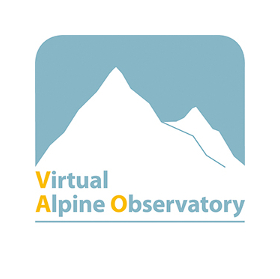
Virtual Alpine Observatory (VAO)

The “Virtual Alpine Observatory” network connects the climate and environmental observations of Alpine high altitude research stations
Climate change is affecting our environment, not least in the sensitive Alpine region. Which parameters of the earth’s natural system are particularly affected? What impact is this having on the region? Many geophysical and chemical processes can be investigated particularly well there because of the exposed location. Clean air, the absence of artificial light pollution, the high altitude and other factors create excellent conditions for high-quality measurements, to help us better understand the diverse processes in the earth’s natural system. At the instigation of the environmental research station Schneefernerhaus (UFS) on the Zugspitze mountain, the “Virtual Alpine Observatory” (VAO) network pools the research activities of Alpine high-altitude research stations in Italy, France, Switzerland, Austria, Slovenia, Norway, Georgia and Germany. According to the Bavarian Minister of the Environment Ulrike Scharf, the aim of the network is to serve as an instrument of cross-border research on climate change and its consequences.
The scientists plan to achieve this by stepping up cooperation in terms of research content, but also by merging existing and future measurement data in a central Alpine Environmental Data Analysis Centre (AlpEnDAC). The networking of AlpEnDAC with the World Data Centre for Remote Sensing of the Atmosphere in Oberpfaffenhofen (WDC-RSAT) and the Leibniz Supercomputing Centre in Garching (LRZ) allows access to other relevant data (such as satellite-based measurements) and complex numerical computer models. “Through transnational and multidisciplinary cooperation, we can find detailed answers to scientific questions in a way that would not have been possible without this infrastructure,” explains Professor Michael Bittner, VAO project coordinator and chairman of the UFS Science Team. This concerns information needed by the tourism, water, energy, insurance and healthcare sectors, but also by policy-makers.
The Bavarian State Ministry of the Environment and Consumer Protection is supporting this cooperation of high-altitude research stations by funding the R&D collaborative project “Expansion and internationalisation of the Virtual Alpine Observatory (VAOII)”. It is funding the 16 German partners with more than €3 million for almost four years. The main priorities of the R&D project are the subjects of atmosphere, the Alpine environment and the Alpine water balance.
Description
Project aims and fields of work
The aim of the nine VAOII R&D sub-projects is to carry out cross-border climate research in the Alps jointly with Alpine research stations in Italy, France, Switzerland, Austria and Germany on the basis of comparable data. The main priorities are:
- Computer networking of high-altitude research stations, including quality assurance and data storage
- Defining and carrying out joint basic and application-oriented research projects on the topics of climate change and climate adaptation
- Scientific support for climate and environmental initiatives
- Supplying information relating to energy transition and natural hazards
- Improving flood protection
- Better estimation of water resources during dry summer periods
- Protecting the Alps from the effects of tourism, e.g. winter sports
- Creating an extended international research consortium in the context of participation in the European research programme “Horizon 2020”
Linking high-altitude research stations in a central Alpine Environmental Data Analysis Centre (AlpEnDAC) creates a platform for sharing data relating to partly different, partly complementary research priorities. The scientists exploit the added value and synergies of the network by carrying out joint research projects. The overriding objective is to step up joint research in an enlarged European framework, seeking funding from Horizon 2020, the EU’s framework programme for research and innovation. The Bavarian Research Alliance is on hand to offer the project partners advice and assistance.
Target group
The results of the VAOII sub-projects are important for the following stakeholders:
- The scientific community concerned with climate and environmental research
- Political decision-makers
- Businesses, particularly in the tourism, water, energy, insurance and healthcare sectors
- Interested members of the public
BayFOR as partner
The Bavarian Research Alliance (BayFOR) helped the VAO partners apply for funding at Bavarian level, and will also support the further development of the project at European level. BayFOR is responsible for the administrative project management of the VAOII sub-projects. The project management activities include organisational management as well as organising internal communication. BayFOR also undertakes public relations duties.
Funding period
The VAOII project started in October 2013. The Bavarian State Ministry of the Environment and Consumer Protection is providing the 16 German partners with funding of more than €3 million up to 31 October 2017.
Consortium
VAOII is coordinated by Professor Michael Bittner from the German Aerospace Centre and the University of Augsburg with the support of BayFOR as administrative project management partner and the bifa environmental institute in Augsburg as partner in the area of financial control.
The participating institutions are:
German Aerospace Centre
Karlsruhe Institute of Technology
Helmholtz Zentrum München
German Environment Agency
Technical University of Munich
LMU Munich
University of Augsburg
Max Planck Institute for Dynamics and Self-Organization
Umweltforschungsstation Schneefernerhaus GmbH
Leibniz Supercomputing Centre of the Bavarian Academy of Sciences and Humanities
bifa environmental institute
Bavarian Research Alliance
Associated partners:
International Foundation, High Altitude Research Stations Jungfraujoch and Gornergrat (Switzerland)
Sonnblick Observatory (Austria)
European Academy of Bozen / EURAC (Italy)
Observatoire des Sciences de l'Univers de Grenoble / OSUG (France)
Arctic Lidar Observatory for Middle Atmosphere Research / ALOMAR (Norway)
Abastumani Astrophysical Observatory, Ilia State University (Georgia)
Observatory Otlica, Centre for Atmospheric Research, University of Nova Gorica (Slovenia)
Further information
Contact

Prof. Dr. Michael Bittner
German Aerospace Centre
University of Augsburg
VAO Coordination
Phone: +49 (0)8153 28-1379
E-mail: michael.bittner@no-spam-pleasedlr.de




